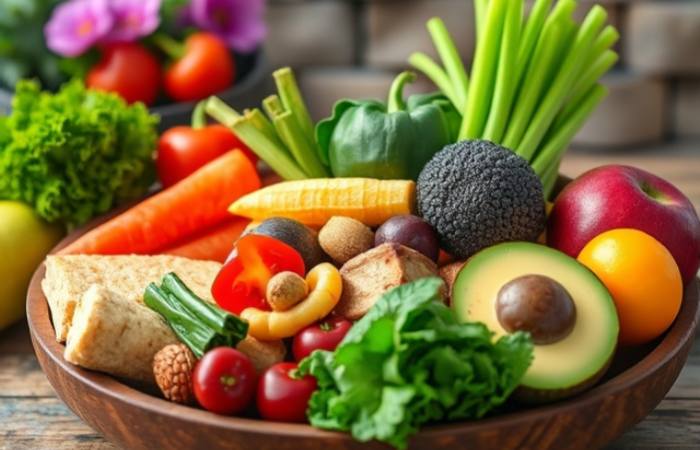Introduction
It is not another fad of creating a balanced diet; it just helps lead a healthy lifestyle, and that encourages vigor and helps prevent chronic disease. It keeps you energetic by using the right amount of nutrient-dense food items and bringing up the quotient of your mental health besides general well-being.
This guide provides easy step-by-step steps together with benefits and tips about implementing balanced nutrition in life.
What is a Balanced Diet?
A good diet provides your body with everything it requires, and the main parts include:
- Proteins (10-25%): They assist in rebuilding and repairing muscles; sources are lean meats, beans, and tofu.
- Fats (20-30%): Fats include positive fatty acids, avocados, and olive oils that support brain and cellular integrity.
- Micro nutrients: Many of the colorful fruits and vegetables are vitamins and minerals.
- Hydration Water maintains both metabolism and health.
Benefits of a Balanced Diet
- High-energy food to increase productive capacity.
- Calorie balance without nutritional deficiency.
- Chronic Disease Prevention Diabetes, Heart Disease,
- Better Mental Health: Nutrition stabilizes the mental mood and brain activities.
- Digestive Health: It promotes gut health and regularity.
Steps to Create a Balanced Diet
1. Understand Your Nutritional Needs:
- By age, sex, and activity: Daily energy requirement Determining.
- This macro nutrient intake may be changed to 50% carbohydrates, 25% proteins, and 25% fats.
2. Include All Food Groups:

- Fruits and vegetables: 50%Then, choose healthy, nutrient-dense foods such as spinach, broccoli, or
- Protein(25%): Has lean meat, fish, lentils, or any other option from plants.
- Whole Grains (25%): Use quinoa, brown rice, and oats for constant
- Fats- Avocados, nuts, and seeds are the primary sources of essential fatty acids.
3. Exercise Portion Control:
- Use small plates to manage the portions well.
- Use guidelines like the Harvard Healthy Eating Plate for eye clarity.
4. Hydration

- At least 8-10 glasses of water per day.
- Hydrating food stuffs such as cucumbers and melons.
5. Dinner Planning:
- Cook and prepare your meals in advance.
- Select whole, unprocessed foods over packaged foods.
Foods to Focus On

- Fruits and Vegetables: antioxidant and fiber.
- Grains: Nutrient-dense Whole grains.
- Lean Proteins: Facilitates muscle repair and immunity.
- The healthy fats help the heart and brain.
Foods to Limit

- Sugary Drinks: Empty calories that elevate blood sugar.
- Processed Foods: Filled with unhealthy fats and sodium.
- The high content of Sodium Causes Hypertension.
Sample Balanced Diet Plan
Breakfast:
- Oatmeal with fresh berries and almonds.
- A milk glass plant-based.
Lunch:
- Grilled chicken salad dressed with olive oil.
- Quinoa with broccoli on the side,
Snack:
- One banana with peanut butter in a spoon.
Dinner:
- Baked salmon accompanied by brown rice and stir-fried
- Greek yogurt in a small bowl.
Common Mistakes to Avoid
- Skipping Meals: Alters metabolism and thus energy.
- Over consumption of Processed Food: Decreases nutrient content.
- Restrictive: Reduces the deficiency of nutrients unless it is a medical condition.
- Used excess supplement -Eat whole food first.
FAQ: Your Burning Questions Answered
How soon will I see the results?
A: Consistency over speed. Most people feel much more energetic in 1-2 weeks and do observe significant health improvements within 2-3 months.
Do I have to count calories?
A: Focus first on food quality and portion control through the use of the plate above, though calorie awareness is helpful.
Can I keep on eating my favorite foods?
A: Absolutely! A balanced diet includes ALL foods in moderation. Indeed, it’s about lifestyle rather than restriction.
Want to take your game to the next level nutrition-wise? Start changing one thing today and layer from there. Your future self thanks you for holding yourself to balanced, sustainable nutrition!
Conclusion
Knowing how to build a balanced diet empowers people to live healthier and more satisfying lives. In doing so, one achieves maximal health and energy through the input of diverse food groups, portion control, and proper hydration. Start small: Every meal is an opportunity for nourishment of the body and mind through informed decision-making.
Accept the balance today and enjoy the long-term fruits of a healthier life!